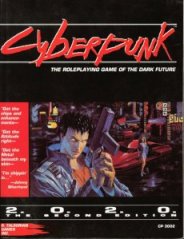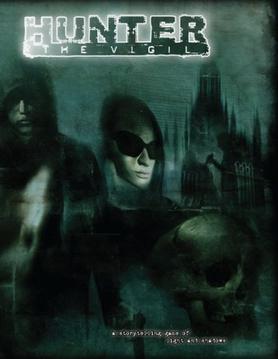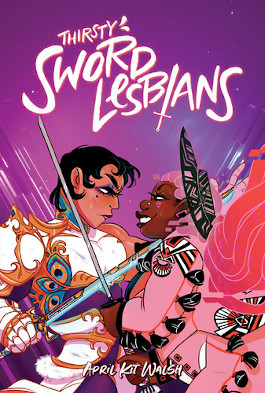Related Research Articles

Cyberpunk is a tabletop role-playing game in the dystopian science fiction genre, written by Mike Pondsmith and first published by R. Talsorian Games in 1988. It is typically referred to by its second or fourth edition names, Cyberpunk 2020 and Cyberpunk Red, in order to distinguish it from the cyberpunk genre after which it is named.

An adventure is a playable scenario in a tabletop role-playing game. These can be constructed by gamemasters for their players, and are also released by game publishers as pre-made adventure modules. Different types of designs exist, including linear adventures, where players move between scenes in a pre-determined order; non-linear adventures, where scenes can go in multiple directions; and solo adventures, which are played alone, without a game group.
Several different editions of the Dungeons & Dragons (D&D) fantasy role-playing game have been produced since 1974. The current publisher of D&D, Wizards of the Coast, produces new materials only for the most current edition of the game. However, many D&D fans continue to play older versions of the game and some third-party companies continue to publish materials compatible with these older editions.

Role-playing games (RPGs) have developed specialized terminology. This includes both terminology used within RPGs to describe in-game concepts and terminology used to describe RPGs. Role-playing games also have specialized slang and jargon associated with them.
Evil Hat Productions is a company that produces role-playing games and other tabletop games. They are best known for the free indie RPG system Fate, Blades in the Dark, and Thirsty Sword Lesbians, all of which have won multiple awards.

Hunter: The Vigil is a tabletop role-playing game originally published by White Wolf Publishing on August 14, 2008, and is the sixth game in their game series Chronicles of Darkness – a reboot of the World of Darkness series. Led by a storyteller, players take the roles of people who have learned of the existence of the supernatural, and fight back against monsters as groups of hunters.

The Pathfinder Roleplaying Game is a fantasy role-playing game (RPG) that was published in 2009 by Paizo Publishing. The first edition extends and modifies the System Reference Document (SRD) based on the revised 3rd edition Dungeons & Dragons (D&D) published by Wizards of the Coast under the Open Game License (OGL) and is intended to be backward-compatible with that edition.

Stephen R. "Steve" Marsh is an American game designer and lawyer best known for his contributions to early editions of TSR's Dungeons & Dragons fantasy tabletop role-playing game (RPG). Some of the creatures he created for the original edition of D&D in 1975 have been included in every subsequent edition of the game.

Powered by the Apocalypse (PbtA) is a tabletop role playing game design framework developed by Meguey Baker and Vincent Baker for the 2010 game Apocalypse World and later adapted for hundreds of other RPGs.
Meguey Baker is a tabletop role-playing game designer, independent publisher and quilt historian. She and her husband Vincent Baker designed Apocalypse World, the first game in the Powered by the Apocalypse system.
Ken Cliffe is a game designer who has worked primarily on role-playing games. He is known primarily as the author and developer for the third edition of Ars Magica, and as co-author and developer of the Trinity, Hunter: The Reckoning and "new" (2004) World of Darkness role-playing games.

Dragon Ball Z: The Anime Adventure Game is a role-playing game published by R. Talsorian Games in 1999 that is based on the Dragon Ball Z anime.

Second Inquisition is a tabletop role-playing game supplement released on March 16, 2022, by Renegade Game Studios, for use with the game Vampire: The Masquerade, and is part of the larger World of Darkness series. It describes globally connected groups of vampire hunters in the game's setting, and how to create antagonists belonging to them for game campaigns.
Avatar Legends: The Roleplaying Game is a fantasy tabletop role-playing game produced by Magpie Games. It is set in the world of the animated television series Avatar: The Last Airbender and The Legend of Korra, and takes place in five different time periods. It sees players take the roles of martial artists, technological experts, or benders – people who can manipulate one of the four classical elements – who fight for balance in the world while also working towards their own goals and struggling with inner balance, represented by opposing ideals held by a character.

City of Mist is an urban fantasy neo-noir detective tabletop role-playing game (RPG) designed by Amít Moshe and published by Son of Oak Game Studio. The game is set in a modern-day metropolis where ordinary people of all walks of life become modern-day reincarnations of myths, legends, and fairy tales, gaining magical powers and abilities.

Thirsty Sword Lesbians is a narrative-focused tabletop role-playing game that emphasizes telling "melodramatic and queer stories". The game was funded via a 2020 Kickstarter campaign and published by Evil Hat Productions in 2021. It uses a modification of the Powered by the Apocalypse game system.
Apocalypse Keys is a mystery tabletop role-playing game about monsters who decide to save the world, designed by Rae Nedjadi and published by Evil Hat Productions. It uses the Powered by the Apocalypse game engine by Meguey Baker and Vincent Baker. The game is inspired by Hellboy, Bureau for Paranormal Research and Defense, Men in Black, Penny Dreadful, and Doom Patrol.
Monster Care Squad is a fantasy tabletop role-playing game by Sandy Pug Games about veterinarians for gods and monsters. It was inspired by Studio Ghibli films. Players inhabit the role of a 'Monster care Specialist', and are tasked with healing creatures of the world.
Heart: The City Beneath is a tabletop role-playing game about surreal underground labyrinths, designed by Grant Howitt and Christopher Taylor.
Vaesen is a horror mystery tabletop role-playing game published by Free League Publishing in 2020, with illustrations by Johan Egerkrans. It draws from mythology and folklore and focuses on monster-hunting.
References
- 1 2 Sands, Michael, ed. (2019). Monster of the Week: Tome of Mysteries. Silver Spring, Md.: Evil Hat Productions. ISBN 978-1-61317-171-4.
- ↑ "Monster of the Week". Generic Games. Retrieved 12 April 2023.
- 1 2 3 Jarvis, Matt (8 March 2023). "'If I was designing Monster of the Week now it would be very different': Michael Sands on the RPG's origins, inspirations and what comes next". Dicebreaker . Retrieved 12 April 2023.
- 1 2 3 Hall, Charlie; Pondsmith, Cody (15 December 2022). "The best tabletop RPGs we played in 2022". Polygon . Retrieved 12 April 2023.
- 1 2 Valentine, Robin (23 February 2023). "I've been playing tabletop RPGs for 20 years, and these are the D&D alternatives I recommend". PC Gamer . Retrieved 12 April 2023.
- 1 2 Sands, Michael (2015). Monster of the Week (Revised ed.). Silver Spring, Md.: Evil Hat Productions. ISBN 978-1-61317-091-5.
- ↑ Gailloreto, Coleman (24 September 2020). "Must-Play Roleplaying Games That Are "Powered By The Apocalypse"". Screen Rant . Retrieved 12 April 2023.
- ↑ Sands, Michael (2022). Monster of the Week (Hardcover ed.). Silver Spring, Md.: Evil Hat Productions. ISBN 978-1-61317-203-2.
- ↑ Golonka, Marek; Sands, Michael (2023). The Codex of Worlds (Hardcover ed.). Silver Spring, Md.: Evil Hat Productions. ISBN 978-1-61317-204-9.
- ↑ Meehan, Alex (1 December 2022). "The Adventure Zone's Griffin and Travis McElroy chat discovering D&D, dream celeb players - and reveal their favourite RPG". Dicebreaker. Retrieved 12 April 2023.